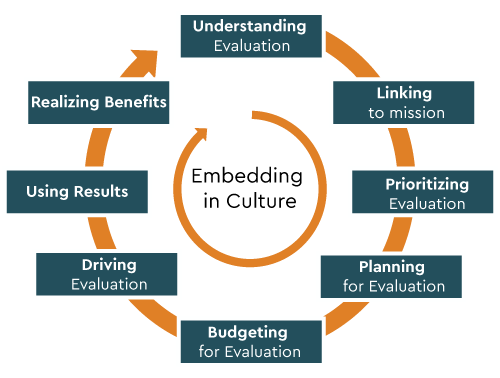As leaders in an organization, the board plays an important role in supporting the practice and use of program evaluation. In this article, we discuss the leadership actions that support program evaluation in an organization and how a nonprofit board of directors can contribute.
This is the third of three articles on the role of nonprofit boards and program evaluation. Previously, we explored different types of evaluation a board typically sees and the nonprofit board’s role in using program evaluation.
If your organization already integrates and implements program evaluation effectively, the board’s role may be minimal in supporting it. If, however, your organization is trying to improve its culture of program evaluation, the board can play a bigger role in supporting it. The following eight actions can help a board of directors better support program evaluation:
“The Leadership Cycle of Actions for Evaluation,” from Alaimo, S. P. (2008). Nonprofits and Evaluation: Managing Expectations from the Leader’s Perspective. In J. G. Carman & K. A. Fredericks (Eds.), Nonprofits and Evaluation. New Directions for Evaluation, 119, 73-92.
Understanding Evaluation
Before a board can support program evaluation, they must understand the purpose of it. Many nonprofits don’t do substantial program evaluation unless someone from the outside, usually a funder, asks for it. This makes program evaluation feel like a requirement or a burden instead of an opportunity to improve. A board of directors can reinforce a positive evaluation culture by showing that they value program evaluation as a core organizational activity—not an extra burden from the outside.
Key Board Actions: See the previous article, Understanding Evaluation.
Linking Evaluation to Mission and Prioritizing It
Individuals sometimes fear program evaluation because they believe they are being judged and held accountable, but an organization that uses its program evaluation to improve its effectiveness will better serve its mission. A board should communicate to staff that the learning and actions that come out of program evaluation are more important than the results themselves: learning and action lead to improvement.
Key Board Actions: Recognize that evaluating a program is hard and can be emotional. Celebrate first steps and forward motion. Promote program evaluation as a mission-supporting practice that makes the organization strong.
Planning and Budgeting for Evaluation
Boards do not plan program evaluations, but they do support program evaluation by including it in their strategic planning and budgeting conversations. Organizations with a strong culture of program evaluation do not view it as an “extra.”
Key Board Actions: Ask about the resources (both human and financial) needed to support program evaluation. Prioritize these resources in planning conversations, and make sure they are explicit in final documents.
Driving Evaluation
Once an organization has the culture and resources to do effective program evaluation, the executive has the responsibility to make it happen. Boards support this effort by asking for periodic updates and engaging in ways that support a positive evaluation culture.
Key Board Actions: See the previous article, Using Program Evaluation.
Using the Results and Realizing the Benefits of Evaluation
Program evaluation benefits an organization when it is used to change and improve. This is called organizational learning. Organizations that do it well adapt to change and grow over time.
Key Board Actions: Rather than reviewing the raw evaluation results, ask staff to prepare a report that includes their analysis and next steps. When reviewing these results with staff, focus on how they will be used rather than on meaning of each specific result. Ask questions like, “What do these results mean for the organization?” “Do you think the organization should change anything?” “How are you planning to use these results?”
When a board understands what program evaluation is, uses it to provide insight about the organization within its community, and supports the organization in conducting it, they promote a healthy evaluation culture and strengthen the organization.